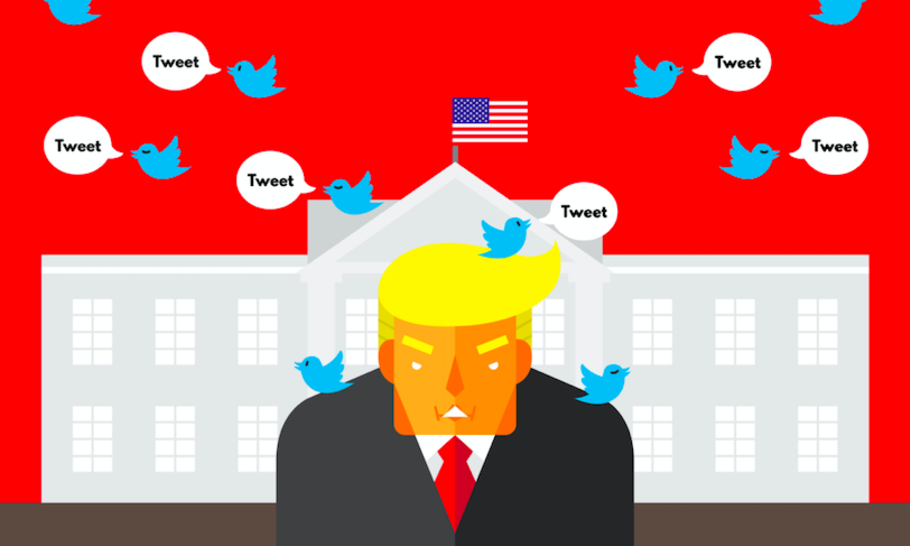Capitals on the Capitol — the case for capital letters

The American election rumbles on in all its geriatric glory. Yet amid the white noise one of the Donald’s main contributions to humanity goes largely unnoticed. Irrespective of whether he ends up being a two-term president, surely no political figure has ever done more to raise the profile — be it to fame or infamy — of the humble capital letter.
These might be the last six months of the presidency en majuscules, for Joe Biden does not seem as enamoured of the Caps Lock as the current Tweeter in Chief. No more FAKE NEWS or MAKE AMERICA GREAT AGAIN, if Biden gets the nuclear codes. Under Trump the capital letter has risen to the world’s attention as never before. At one point it was even a potential trigger for World War Three, after the President’s famously cautious tweet of July 2018:
‘To Iranian President Rouhani: NEVER, EVER THREATEN THE UNITED STATES AGAIN OR YOU WILL SUFFER CONSEQUENCES THE LIKES OF WHICH FEW THROUGHOUT HISTORY HAVE EVER SUFFERED BEFORE. WE ARE NO LONGER A COUNTRY THAT WILL STAND FOR YOUR DEMENTED WORDS OF VIOLENCE & DEATH. BE CAUTIOUS!’
That said, the emperor Augustus (d. 14 AD) may too have laid claim to being the king of the capital letter — he certainly laid claim to enough else. At the end of his life, Augustus wrote an account of his achievements in office (the Res Gestae Divi Augusti), which he ordered be inscribed on vast bronze tablets and put up on his mausoleum in Rome upon his death. After this was duly done, copies were made and then inscribed on temples around the empire. The understandable preference of the men with chisels for straight lines meant that these were all written in continuous block caps. Undeniably Trumpy.
The first alphabets were solely made up of capitals. It was only with pen and ink that lower case letters gained increased recognition, the hand naturally softening some of the capitals’ harsh edges. Alcuin of York, the eighth century Benedictine monk, may or may not have played a central role in developing so-called Carolingian minuscule, the lower case Roman alphabet that developed towards the end of the first millennium AD.
The terminology of “upper case” and “lower case” comes from the 16th century and the spread of printing. The printing blocks for individual letters would be kept in trays known as “cases”. The upper case, which contained the capitals, was so-called because it was kept literally above the lower case, which contained the lower case letters.
And now we have QWERTY, Caps Lock and Shift. We’ve gone from inscribing to hand-writing to typing and finally to voice recognition, where the hand is completely absent. All this prompts the question, what is the future for the capital letter?
As a teacher, my students think me quaint when I insist that they use capitals correctly. They know by now that it’s a (not so) private passion, and so they give me “France” and “French” rather than “france” and “french” — it amuses me, they think, and keeps me quiet, but they don’t really see the point.
And what is the point? There are of course the bigger questions about the value we accord to the things we capitalise, but, apart from anything, it’s surely aesthetic. Where block caps has a tendency to make the eyes bleed — that Trump tweet had you blinking, didn’t it? — a paragraph devoid of capitals is equally a struggle to read. Even this short article would be fairly intolerable without the inherent variation offered by the mix of majuscule and miniscule. Capitals guide you to the start of the sentence, and, as with punctuation, provide points of difference. The text — like the voice — needs to rise and fall.
Will we stick with them? This is the first generation of children who learn to swipe before they can write, and it’s an undoubted faff to capitalise while texting at speed. This too is the first generation for whom voice recognition will start to have serious applications, rather than merely being a party piece.
As for a president scrabbling for a legacy amid the ruins of the US economy, he might turn his thoughts to what he has done for orthography. The apostrophe has long had its champions — not that it seems to have done it much good — but capitals? Now, however, for better or for worse, Trump has pulled capital letters into his own special limelight — though whether they will thank him for that is quite another question.




